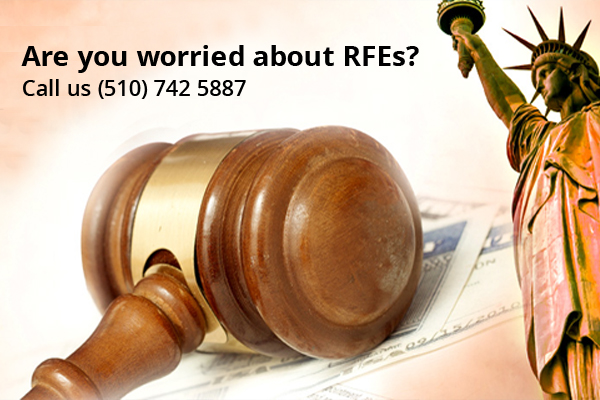
Recently we have noticed a surge in requests for evidence(RFE) and notice of intent to deny(NOID). While the RFEs and NOIDs are normal tools adopted by the USCIS to look into cases which have insufficient information or for clarification, officers has the discretion to actually issue RFEs or NOIDs under 8 CFR 103.2(b)(8). The rule also allows officers to issue denials without RFEs or NOIDs. However accordingly to a policy memorandum issued in June 3, 2013 (Requests for Evidence (Final)),”…an RFE is not to be issued when the evidence already submitted establishes eligibility or ineligibility in all respects for the particular benefit or service.” The memo also adds that “An unnecessary RFE can delay case completion and result in additional unnecessary costs to both the government and the individual (a term used throughout this PM to refer to the person or entity filing the particular application, petition, or other request).”
Under the same Policy Memo (PM) of June 3, 2013 a”… a NOID is required as describe under AFM Chapter 10.5(a)(3). A NOID is required before denying any immigration benefit ” in only enumerated circumstances. The PM also describes when an NOID is appropriate for example in an “skeletal filing” and even when the individual has met the threshold of the requested benefits, the individual does not merit an exercise of favorable discretion.
As the PM clearly explains there are sometimes good reasons to issue both RFEs and NOIDs. But the question is why when all the conditions are met and the documents have actually been provided according to the requirements, RFEs are still being issued?
This is a question which many practitioners and applicants have been pondering on for months now. For example, a case well prepared and filed with all the required documents, are still receiving RFEs. The worse part is that the RFE is requesting the same documents which have already been provided. The irony is when the same documents are being provided “again”, the practitioner is getting an approval. This means that the original documents which were submitted in the first place were the right one, although at this point the practitioner is putting emphasis on the same documents. This leaves many of us to wonder whether the RFEs are not just being ‘abused’ by the USCIS or being used to ‘buy time’ on cases. The answer probably will never be released until we find out what were the ‘real reasons’ of the RFEs.
Situation where RFEs followed by NOIDs instead of follow-up RFEs
The adjudicating officer as per the same PM mentioned above, has the right to issue “follow up RFEs”. This means a second RFE can be issued. However recently we have noticed that instead of follow-up RFEs, we are seeing the USCIS issuing NOIDs instead. It might just be a coincidence but after speaking to many clients in consultations, and experiencing the same with some of our cases, it seems that the NOIDs are not appropriate and in fact seems to be a bit over-reaching. NOIDs although works just like RFEs, they have a “chilling effect” over both the practitioner and the applicants.
RFEs based on wrong information obtained through the internet or other unreliable sources.
USCIS is relying more and more on social media, and search engines to obtain their information. It should be noted that such practices are permissible. According to the PM,”… officers have the discretion to validate assertions or corroborate evidence and information by consulting USCIS or other governmental files, systems, and databases, or by obtaining publicly available information that is readily accessible. 8 USC 1357(b); 8 CFR 103.2(b)(16)(i).” But unfortunately, as we all know, these tools are not entirely reliable but it seems USCIS is relying on them to question clients under RFEs and NOIDs or even denying cases. We believe that in the internet age where even “Wikipedia” is not one hundred percent reliable, USCIS should not rely on a “google search” to deny a case. For example, we have had a case where the wrong phone number was used because the company carried the same name to check on the H1B candidate.
RFEs in situations where premium is being filed.
This is another issue which many have been dealing with. As soon as they upgrade their cases to premium or file under premium, the chances of RFEs are being increased. Although this has not been proven, it seems that a quick survey or pulling of records from USCIS can actually confirm and deny such a problem. We have actually analyzed this situation in this video:
After consideration, it seems that USCIS might in fact, be over-using or even abusing RFEs and NOIDs
By analyzing the few situations we have encountered and taking into consideration the increase number of RFEs which we are hearing about, we wonder whether the USCIS is not being over-zealous or over-reaching with their RFEs and NOIDs. We understand that such tools are indispensable to determine whether a case merits approval or not, but what we do not understand is that some RFEs or NOID just do not “make sense”. They borderline being are “ridiculous” and can often be arbitrary and capricious. Such RFEs and NOIDs not only cost the government more money but they lead to unnecessary stress on the applicants.
As such we pray the government to review their policies and ask them to actually review their policies to allow applicants to feel that their applications are not being arbitrarily issued RFEs, NOIDs or being denied.

